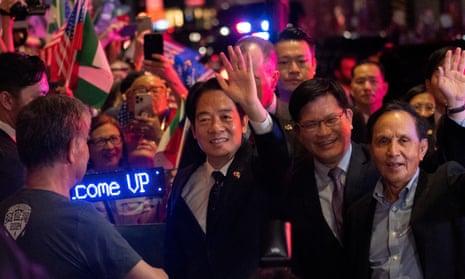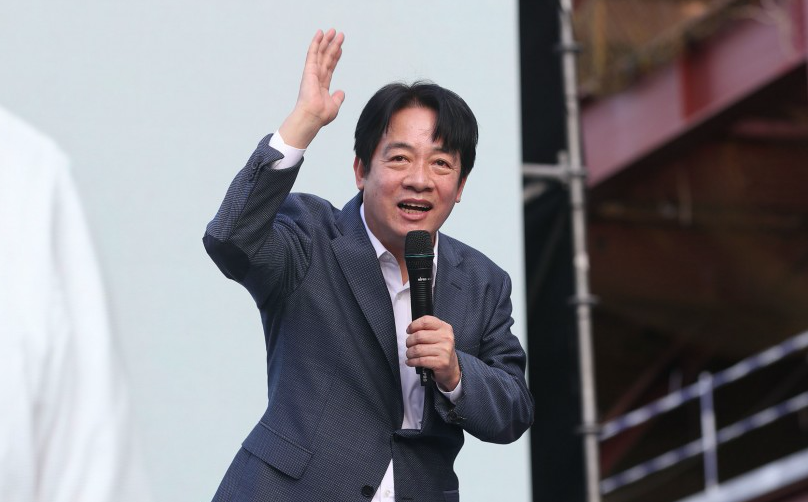Taiwan Vice President Defies China’s Warnings, Embarks on Crucial US Visit

Taiwan Vice President Defies China’s Warnings, Embarks on Crucial US Visit
In a bold move that showcases Taiwan’s determination to assert its global presence, the Vice President of Taiwan, Lai Ching-te, departed for the United States despite stern warnings from China. This high-stakes visit comes amidst escalating tensions between Taiwan and mainland China, underscoring the delicate geopolitical balance in the region. As the Vice President sets foot on American soil, the world watches closely, recognizing the significance of this journey in shaping the future dynamics of East Asian politics.
The Vice President’s trip holds symbolic importance, marking Taiwan’s resolve to strengthen its international relationships despite China’s efforts to isolate the island nation. The decision to undertake this voyage also highlights the growing international recognition of Taiwan’s contributions in various sectors, including technology, trade, and culture.

The visit comes at a critical juncture, with China’s assertiveness in the South China Sea and its continuous claims over Taiwan heightening concerns among regional stakeholders. While Taiwan functions as a separate and self-governing entity, China considers it an integral part of its territory and has repeatedly expressed opposition to any move that furthers Taiwan’s global standing.
This recent diplomatic maneuver is in line with Taiwan’s strategy to diversify its international alliances, thereby reducing its dependence on any single partner. Historically, the United States has been a crucial ally for Taiwan, providing security assurances and economic support. The visit by the Vice President not only reaffirms the strong bond between the two nations but also sends a clear message to China that Taiwan will not bow to its pressures.
Amid the Vice President’s journey, experts anticipate that discussions will revolve around a range of topics, including trade partnerships, technological collaborations, and regional security. The United States has shown a keen interest in bolstering Taiwan’s defense capabilities, considering it as a key player in maintaining stability in the Indo-Pacific region. However, any overt military cooperation could further escalate tensions between the US and China, triggering an international crisis with far-reaching consequences.

China’s reaction to the Vice President’s visit has been predictably stern. Beijing has warned the United States against meddling in its internal affairs by engaging with Taiwan at such a high level. China’s government-controlled media has emphasized the potential consequences of the visit on Sino-American relations, portraying it as a blatant interference in China’s territorial sovereignty.
Taiwan’s ability to navigate this diplomatic tightrope underscores its skilled diplomacy. The Vice President’s visit, while signifying Taiwan’s quest for global recognition, is also an exercise in judicious statecraft. By carefully managing the optics of the visit and focusing on shared interests with the United States, Taiwan aims to avoid unnecessarily provoking China while still advancing its own strategic objectives.
The situation, however, remains fluid. As the Vice President engages in discussions with US officials, the international community closely observes China’s response. The outcomes of these deliberations could set the tone for future interactions between Taiwan, the United States, and China.
One aspect that cannot be ignored is the impact of Taiwan’s actions on its own population. The Vice President’s journey serves as a source of inspiration for many Taiwanese citizens who seek a stronger global identity for their nation. While Taiwan has flourished economically and politically, it often grapples with a perceived lack of international recognition due to China’s diplomatic pressure.
In this context, the Vice President’s visit provides a sense of validation to the people of Taiwan, reinforcing their belief in the nation’s ability to hold its ground on the international stage. It sends a powerful message that Taiwan’s aspirations for sovereignty and recognition are not confined by China’s rhetoric.

As the Vice President’s visit unfolds, it’s important to recognize the nuances of the situation. The Taiwan-US relationship, while robust, is delicate. Striking the right balance between extending support to Taiwan and avoiding an irreparable rupture with China requires intricate diplomatic finesse.
As the Vice President’s journey unfolds, it lays bare the complexities of modern diplomacy in an interconnected world. Taiwan’s efforts to establish stronger ties with the United States demonstrate the shifting sands of global alliances. In an era where economic interdependence often coexists with geopolitical rivalries, Taiwan’s bid for recognition emphasizes the importance of mutual interests as the driving force behind international partnerships.
China’s vehement opposition to the Vice President’s visit highlights the deeply entrenched historical and political factors at play. Beijing’s insistence on the “One China” policy and its aspiration for national reunification create a steadfast stance that reverberates through its diplomatic engagements. While the Vice President’s visit is seen by China as a provocative move, Taiwan contends that it has every right to pursue its own foreign relations independently, just as any sovereign nation would.
Within the context of this intricate geopolitical dance, the United States faces its own strategic considerations. As it seeks to maintain stability in the region, the U.S. must weigh its support for Taiwan against the potential backlash from China. Balancing the interests of a long-standing ally with the necessity of avoiding a broader conflict is a tightrope act that requires astute navigation. The outcome of this visit, therefore, will be a testament to the United States’ ability to pursue its interests without inadvertently escalating tensions.
In the grand theater of international relations, the Vice President’s journey serves as a reminder that even seemingly straightforward actions carry profound implications. As Taiwan’s representative engages in diplomatic dialogues, the choices made at this juncture will ripple through time, shaping the narratives of nations and the course of history. In this delicate dance of power, diplomacy, and sovereignty, the world watches with bated breath, aware that each step taken has far-reaching consequences that could reverberate for years to come.
In conclusion, the Vice President’s departure for the United States amid China’s warnings represents a pivotal moment in East Asian geopolitics. This voyage carries profound implications for Taiwan’s global standing, its relationship with the United States, and the delicate equilibrium in the region.
While the Vice President’s trip is symbolic, it also underscores the pragmatic approach that Taiwan is taking to secure its interests without igniting a larger conflict. As the world watches this high-stakes diplomatic dance, it remains to be seen how the intricate threads of international relations will weave together to shape the future of this volatile region.




